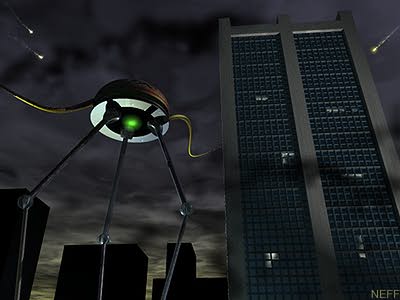Orson Welles' Mercury Theatre Broadcast of H.G. Wells'
The War of the Worlds
Listen to the original "The War of the Worlds" broadcast in RealAudio
from earthstation1.simplenet.com
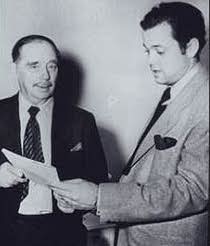
Author H.G. Wells with Orson Welles
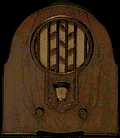
| In the fall of 1938, genius extraordinaire
Orson Welles, then master of broadcast theatre production for the Columbia
Broadcasting System, produced and starred in an exciting on-air dramatization
by Howard Koch, based on author H.G. Wells' classic science-fiction "The
War of the Worlds" as part of the Mercury Theatre's Halloween offering.
 Read the original New York Times Article regarding the broadcast
"This is Orson Welles, ladies and gentlemen, out of character to assure you that The War of The Worlds has no further significance than as the holiday offering it was intended to be. The Mercury Theatre's own radio version of dressing up in a sheet and jumping out of a bush and saying Boo! Starting now, we couldn't soap all your windows and steal all your garden gates by tomorrow night. . . so we did the best next thing. We annihilated the world before your very ears, and utterly destroyed the C. B. S. You will be relieved, I hope, to learn that we didn't mean it, and that both institutions are still open for business. So goodbye everybody, and remember the terrible lesson you learned tonight. That grinning, glowing, globular invader of your living room is an inhabitant of the pumpkin patch, and if your doorbell rings and nobody's there, that was no Martian.... it's Hallowe'en." |
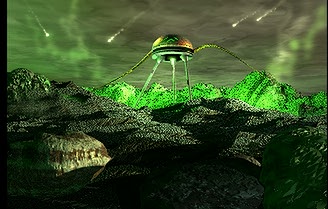 "Now wait a minute! I see
something on top of the cylinder. No, it's nothing but a shadow. Now the
troops are on the edge of the Wilmuth farm. Seven thousand armed men closing
in on an old metal tube. Wait, that wasn't a shadow! It's something moving
. . . solid metal . . . kind of shieldlike affair rising up out of the
cylinder . . . It's going higher and higher. Why, it's standing on legs
. . . actually rearing up on a sort of metal framework. Now it's reaching
above the trees and the searchlights are on it. Hold on!" "Now wait a minute! I see
something on top of the cylinder. No, it's nothing but a shadow. Now the
troops are on the edge of the Wilmuth farm. Seven thousand armed men closing
in on an old metal tube. Wait, that wasn't a shadow! It's something moving
. . . solid metal . . . kind of shieldlike affair rising up out of the
cylinder . . . It's going higher and higher. Why, it's standing on legs
. . . actually rearing up on a sort of metal framework. Now it's reaching
above the trees and the searchlights are on it. Hold on!" |
 "Good heavens, something's wriggling
out of the shadow like a gray snake. Now it's another one, and another.
They look like tentacles to me. There, I can see the thing's body. It's
large, large as a bear and it glistens like wet leather. But that face, it . .
. Ladies and gentlemen, it's indescribable. I can hardly force myself to
keep looking at it. The eyes are black and gleam like a serpent. The mouth
is V-shaped with saliva dripping from its rimless lips that seem to quiver
and pulsate. The monster or whatever it is can hardly move. It seems weighed
down by . . . possibly gravity or something. The thing's raising up. The
crowd falls back now. They've seen plenty. This is the most extraordinary
experience. I can't find words . . . I'll pull this microphone with me
as I talk. I'll have to stop the description until I can take a new position.
Hold on, will you please, I'll be right back in a minute." "Good heavens, something's wriggling
out of the shadow like a gray snake. Now it's another one, and another.
They look like tentacles to me. There, I can see the thing's body. It's
large, large as a bear and it glistens like wet leather. But that face, it . .
. Ladies and gentlemen, it's indescribable. I can hardly force myself to
keep looking at it. The eyes are black and gleam like a serpent. The mouth
is V-shaped with saliva dripping from its rimless lips that seem to quiver
and pulsate. The monster or whatever it is can hardly move. It seems weighed
down by . . . possibly gravity or something. The thing's raising up. The
crowd falls back now. They've seen plenty. This is the most extraordinary
experience. I can't find words . . . I'll pull this microphone with me
as I talk. I'll have to stop the description until I can take a new position.
Hold on, will you please, I'll be right back in a minute." |
Listen to WAV file of this moment from "War of the Worlds" (450k)
from earthstation1.simplenet.com
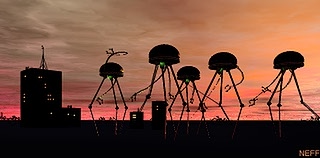 "Streets are all jammed. Noise in
crowds like New Year's Eve in city. Wait a minute . . . Enemy now in sight
above the Palisades. Five -- five great machines. First one is crossing
river. I can see it from here, wading the Hudson like a man wading through
a brook . . . A bulletin's handed me . . . Martian cylinders are falling
all over the country. One outside Buffalo, one in Chicago, St. Louis .
. . seem to be timed and spaced . . . Now the first machine reaches the
shore. He stands watching, looking over the city. His steel, cowlish head
is even with the skyscrapers. He waits for the others. They rise like a
line of new towers on the city's west side . . . Now they're lifting their
metal hands. This is the end now. Smoke comes out . . . black smoke, drifting
over the city. People in the streets see it now. They're running towards
the East River . . . thousands of them, dropping in like rats. Now the
smoke's spreading faster. It's reached Times Square. People trying to run
away from it, but it's no use. They're falling like flies. Now the smoke's
crossing Sixth Avenue . . . Fifth Avenue . . . one hundred yards away .
. . it's fifty feet . . ." "Streets are all jammed. Noise in
crowds like New Year's Eve in city. Wait a minute . . . Enemy now in sight
above the Palisades. Five -- five great machines. First one is crossing
river. I can see it from here, wading the Hudson like a man wading through
a brook . . . A bulletin's handed me . . . Martian cylinders are falling
all over the country. One outside Buffalo, one in Chicago, St. Louis .
. . seem to be timed and spaced . . . Now the first machine reaches the
shore. He stands watching, looking over the city. His steel, cowlish head
is even with the skyscrapers. He waits for the others. They rise like a
line of new towers on the city's west side . . . Now they're lifting their
metal hands. This is the end now. Smoke comes out . . . black smoke, drifting
over the city. People in the streets see it now. They're running towards
the East River . . . thousands of them, dropping in like rats. Now the
smoke's spreading faster. It's reached Times Square. People trying to run
away from it, but it's no use. They're falling like flies. Now the smoke's
crossing Sixth Avenue . . . Fifth Avenue . . . one hundred yards away .
. . it's fifty feet . . ." |
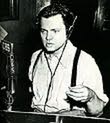 Welles had no idea of the consequences of this seemingly innocuous
choice of entertainment. The play used the names of actual places well
known to most, especially those on the east cost, and was set in current
time with its use of apparent live and remote announcers in the field,;
tales of fiery meteors falling to the earth... of strange metallic cylinders
embedded in the ground emitting unearthly noises and the subsequent uprising
of monstrous, mechanized Martian war machines bent on world conquest. The
play became all too real for hundreds of thousands of Americans who were
apparently glued to their radios aghast. Whether they missed the introduction
and the intermission, both of which stated plainly that what was
being broadcast was merely a radio-play, or whether holiday spirits enhanced
the naturally alarming elements of something dreadful and terrifying coming
from another world... we'll never really know. But it became known as the
night that panicked America.
Welles had no idea of the consequences of this seemingly innocuous
choice of entertainment. The play used the names of actual places well
known to most, especially those on the east cost, and was set in current
time with its use of apparent live and remote announcers in the field,;
tales of fiery meteors falling to the earth... of strange metallic cylinders
embedded in the ground emitting unearthly noises and the subsequent uprising
of monstrous, mechanized Martian war machines bent on world conquest. The
play became all too real for hundreds of thousands of Americans who were
apparently glued to their radios aghast. Whether they missed the introduction
and the intermission, both of which stated plainly that what was
being broadcast was merely a radio-play, or whether holiday spirits enhanced
the naturally alarming elements of something dreadful and terrifying coming
from another world... we'll never really know. But it became known as the
night that panicked America.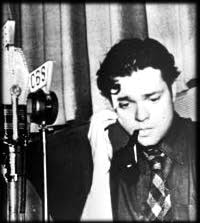 Welles had made a tragic error. The press and the nation was considerably
unforgiving for a very long time to come. What was intended as a pre-Halloween
spook-story became a nightmare resulting in several actual deaths by suicide
(though to this day many claim such never took place) and countless other
repercussions which Mr. Welles could never have foreseen. One of the more
oft-told accounts was of a particular farmer who, when hearing about the
menacing Martian war machines with their tenticular arms and great stilt-like
metallic legs bounding across the countryside, went out into his field
armed to the teeth, ready to do battle with the coming metal-monster. In
the darkness the poor man mistook his neighbors watertower for one of the
towering martian invaders, blowing several large holes in it with his shotgun.
Other stories circulated that people had taken poison rather than to endure
the coming Martian holocaust brought by the mysterious black, toxic smoke
given off by the relentless, trodding war machines. One fact is certain,
many people near and about the real-life geographical locations mentioned
in the play packed bags in a panic and hit the highways trying to flee
the cosmic cataclysm.
Welles had made a tragic error. The press and the nation was considerably
unforgiving for a very long time to come. What was intended as a pre-Halloween
spook-story became a nightmare resulting in several actual deaths by suicide
(though to this day many claim such never took place) and countless other
repercussions which Mr. Welles could never have foreseen. One of the more
oft-told accounts was of a particular farmer who, when hearing about the
menacing Martian war machines with their tenticular arms and great stilt-like
metallic legs bounding across the countryside, went out into his field
armed to the teeth, ready to do battle with the coming metal-monster. In
the darkness the poor man mistook his neighbors watertower for one of the
towering martian invaders, blowing several large holes in it with his shotgun.
Other stories circulated that people had taken poison rather than to endure
the coming Martian holocaust brought by the mysterious black, toxic smoke
given off by the relentless, trodding war machines. One fact is certain,
many people near and about the real-life geographical locations mentioned
in the play packed bags in a panic and hit the highways trying to flee
the cosmic cataclysm.